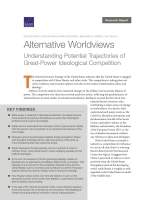by Stephen Watts, Nathan Beauchamp-Mustafaga, Benjamin N. Harris, Clint Reach
 To what extent have China and Russia formulated alternative ideologies or worldviews that challenge today's international order? Because such alternatives have not yet been clearly or systematically articulated, what factors might drive the emergence of a cohesive, alternative ideology?
To what extent have China and Russia formulated alternative ideologies or worldviews that challenge today's international order? Because such alternatives have not yet been clearly or systematically articulated, what factors might drive the emergence of a cohesive, alternative ideology?
How do these rivals currently pursue ideological competition with the United States, and how might they do so in the future?
How do other actors, including nonstate actors, influence this competition?
Under what conditions are China and Russia likely to persuade audiences around the world of the advantages of alternatives to the current international order?
What is at stake for the United States and its allies in this competition?
The United States is engaged in a new era of great-power competition, which is taking place, in part, in the realms of information, ideas, and ideology. The goal of this report is to help U.S. decisionmakers better anticipate changes in the global competition of ideas and adapt policy accordingly. The authors of this report take a closer look at two state actors (China and Russia) and two nonstate actors (populist movements and transnational advocacy networks) to analyze what an ideological competition with the United States might look like in the future. The analysis is based on research literature, recent events, and the public comments of leaders of state and nonstate actors.
In an appendix, the authors also use different actors' contemporary discourses and broader patterns of ideational dissemination to sketch a number of alternative future trajectories for ideological competition. The goal is to help decisionmakers better anticipate changes in the global competition of ideas and adapt U.S. policy accordingly.
Key Findings
State power is reflected in ideological ambitions: As states become more powerful (or perceive themselves as such), their ideological ambitions tend to grow accordingly.
States tend to externalize their domestic forms of governance: States with the power to do so typically try to reproduce themselves on the world stage.
Divergent governing ideologies heighten threat perceptions: States with divergent ideologies tend to perceive actions of the other as more threatening than they otherwise would.
Rapid ideological change typically occurs in periods of crisis: In ordinary times, most people tend to resist sweeping updates to their political ideologies.
At its core, China's governing ideology centers on development, as opposed to the Western liberal focus on freedom. This ideology is only one part of the competition between China and the United States, but it is one that could shift the power balance without the need for military force or economic leverage.
How Russia's ideas evolve over time will depend, in part, on the perceived success of the current anti-Western, conservative narrative that its leaders are promoting.
In the age of the internet and social media, social resilience appears to be at particular risk in the face of narrowcasting—the targeting of content (including political content) to narrow subpopulations.
No comments:
Post a Comment